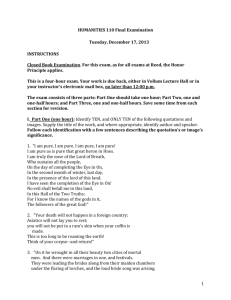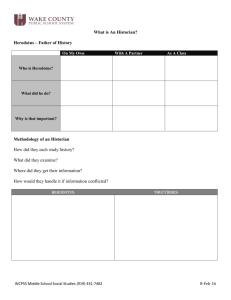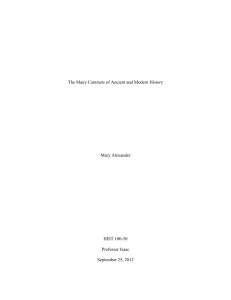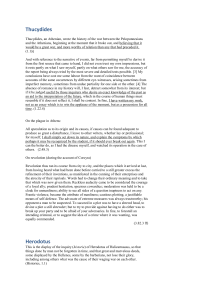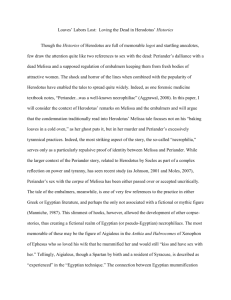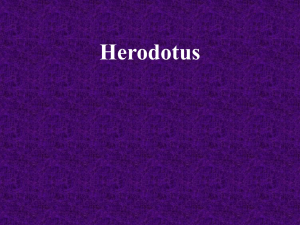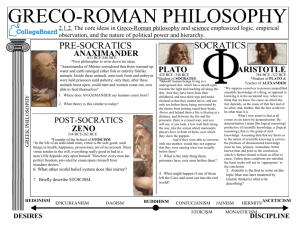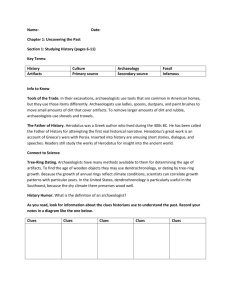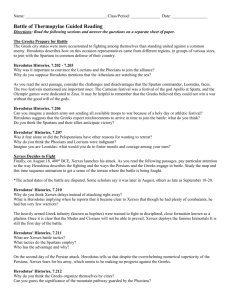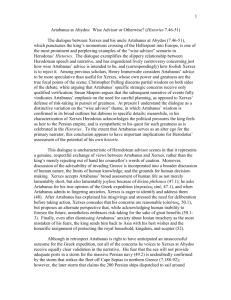Michael Tarala-History Sources and Methods-Beiting
advertisement
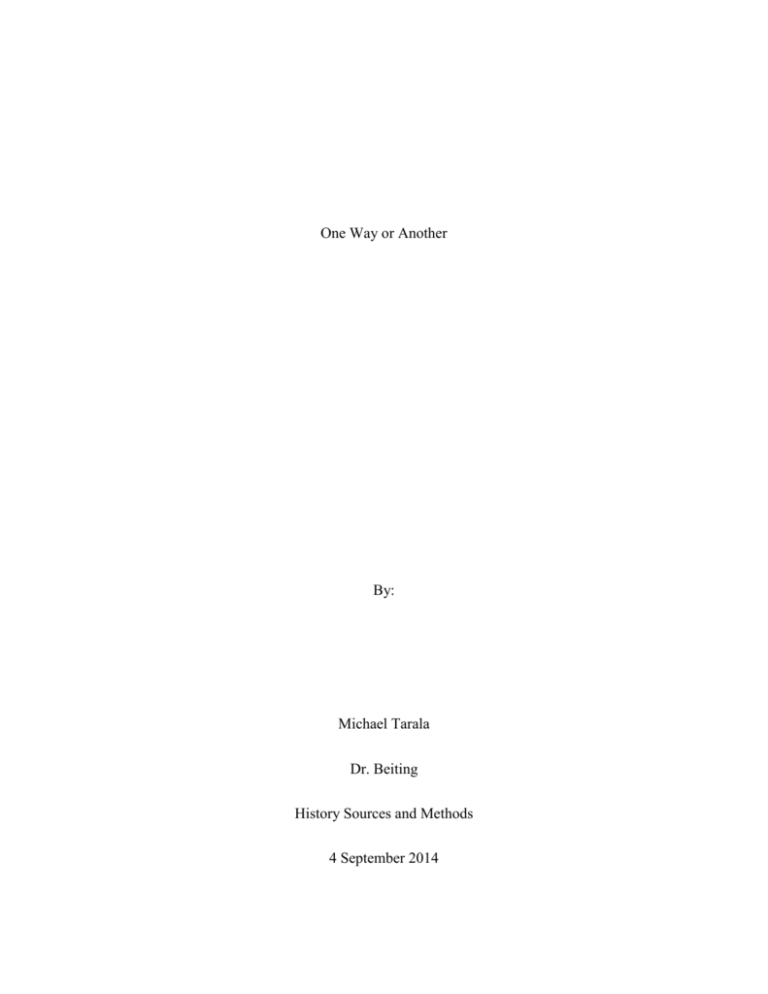
One Way or Another By: Michael Tarala Dr. Beiting History Sources and Methods 4 September 2014 Tarala 2 Throughout the many centuries that have come and gone, there have been many learned people who have taken the time to record history. Some histories are more accurate than others but all of them have certain characteristics that make them “history”. History is recorded for many reasons but what drives history is inquiry and knowledge through investigation. As one would expect, a history is only authentic if it is written down. This makes history a lot like the field of law. The field of law makes something impossible to have happened if it has not been recorded and written down. This makes history a matter of choice. The writer or scribe had to make the choice to write down the events and think those events and underlying themes were important enough to do so. Transforming these events and themes from ideas and memories to written records was not an easy task. For this reason was why there were so few people who were successful in making accurate portrayals and recordings. Two Greek historians made this choice which gave the rest of the world a template for histories to be recorded all over the world. The two historians mentioned above were Herodotus and Thucydides. Both of these historians had different styles of recording their histories, however, and their work was revolutionary. The Greeks were more advanced in many ways and in their research and making of history, they did not disappoint. There are many factors that play into the works of each of these Greek historians and one needs to look with greater detail into the lives of each of them in order to understand where they are coming from. The first of these two great historians was Herodotus. Herodotus lived from 484-425 B.C. Herodotus has been known as the Father of History and this title stemmed from how highly the Greeks thought of him and his works. His family was very well off and were in the higher Tarala 3 class of society. This gave Herodotus a simpler route in catching the Greek’s attention. Herodotus is known as one of the most charming of ancient writers. His writings were poetic and although he expressed himself in this beautiful literary fashion, his critique of prose writers was impressive. He travelled a lot and on his travels, he took notes and recorded events from his encounters. “At all the more interesting sites he took up his abode for a time; he examined, he inquired, he made measurements, and he accumulated materials. Having in his mind the scheme of his great work, he gave ample time to the elaboration of all its parts, and took care to obtain by personal observation a full knowledge of the various countries.”1 This quote shows how Herodotus worked tirelessly in order to make accurate accounts and records which came together and made sense in a poetic and lyrical fashion. He wanted to observe his findings in depth, which express his love for detail and preciseness. As a historian, Herodotus had many questions that needed to be answered. If he did not have any sources, there would not be any history. One question that he, as well as all other renowned historians, asked was: “What happened?” This question is obvious but he did not stop there. In order to really record history, he also asked the question: “Why did it happen?” Furthermore, he proceeded to inquire more into the past and asked the question: “Why does it matter?” All of these questions must be answered in order to have a true history. Herodotus knew this and in answering these questions, he went further than any other historian had ever gone before. 1 Paul Halsall, Ancient History Sourcebook, 11th Britannica, 1999. Tarala 4 Historians record history for many reasons. The reason that Herodotus gave for his creation of recorded history was interesting. He said that it was “so that human achievements may not become forgotten in time, and great and marvelous deeds—some displayed by Greeks, some by barbarians—may not be without their glory; and especially to show why the two peoples fought with each other.”2 This comes with the human element because there is not a single human on earth who wants to be forgotten and most people will go the extra mile to make sure that does not happen. Herodotus did this in exceptional ways, however. John Burrow states that: “his history was a monument, a marker set down against the oblivion with which time threatens all human deeds.”3 This means that Herodotus was like a trail blazer and a leader for the historians to come after him. This quote also expresses how time is the antagonist of the people, places, themes, and events in these vast histories that stretch from era to era and from civilization to civilization. Thucydides on the other hand, was very different in his style and in his recording of history. First of all, he lived from 460-400 B.C. He is also thought of as one of the great ancient historians. He also came from a higher class family and he owned several gold mines. Not much else is known about his actual life and scholars are even unsure of the date in which he died. Thucydides’ style was much more dry and scientific in nature. While Herodotus focused on events of the past, much of Thucydides’ works were compiled during the Peloponnesian War. He relied on his own recollections as well as several other actual witnesses for his works. Even though both Herodotus and Thucydides came from Greece, their ideas of history and the way 2 John Burrow, A History of Histories: Epics, Chronicles, Romances, and Inquiries from Herodotus and Thucydides to the Twentieth Century. (New York, Vintage Books, 2009) 14. 3 Ibid. Tarala 5 they went about creating a recorded version of history was very different and this is apparent in their works. Thucydides hoped that his History would “be judged useful by those inquirers who desire an exact knowledge of the past as an aid to the interpretation of the future, which in the course of human things must resemble if it does not reflect it.”4 This means that Thucydides had a didactic view of history. He believed that through looking at and studying history, one could predict the future and would in turn, not make the mistakes that he had made in the past. Herodotus had a monumental view of history. This is because he wanted there to be a sense of immortality for the accomplishments people made as well as so that they would receive the glory they so deserved. As one can see, both Herodotus and Thucydides were very different historians. This being in their style, time frame, and reasoning. Even though they were very different, both of them are still regarded as two of the most influential historians of all time. This means that there is no perfect or certain way that history should be recorded. It is something that historians have debated about for many years. In the end, all people have a reason of why and how they want things to be remembered and as long as the human aspect remains intact, there will be many different ways of looking at history for millennia to come. Thucydides, “The History of the Peloponnesian War, in Historians at Work I ed. Peter Gay and Gerald Cavanaugh (New York, Harper and Row, 1972). 4
